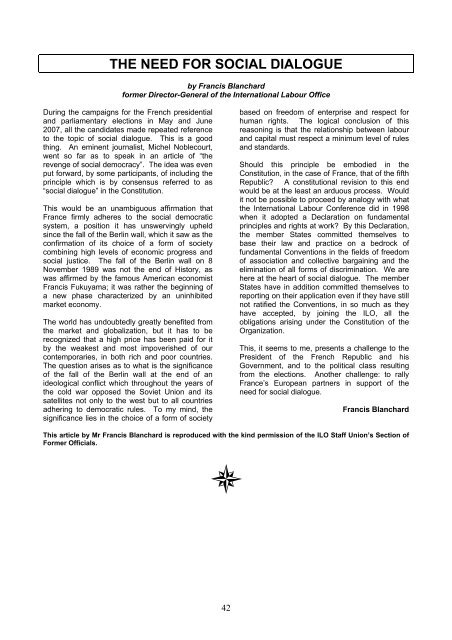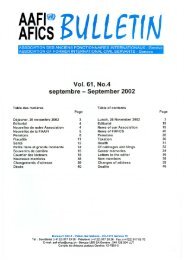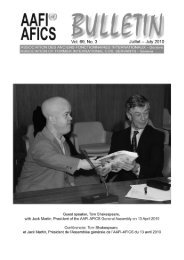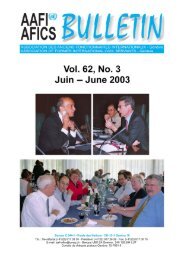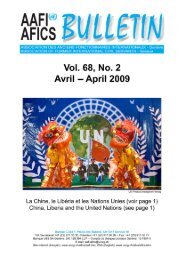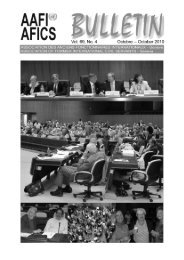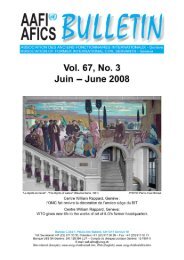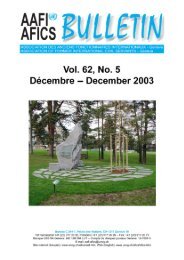VOL. 66, NO. 5 - aafi-afics - UNOG
VOL. 66, NO. 5 - aafi-afics - UNOG
VOL. 66, NO. 5 - aafi-afics - UNOG
Create successful ePaper yourself
Turn your PDF publications into a flip-book with our unique Google optimized e-Paper software.
THE NEED FOR SOCIAL DIALOGUEby Francis Blanchardformer Director-General of the International Labour OfficeDuring the campaigns for the French presidentialand parliamentary elections in May and June2007, all the candidates made repeated referenceto the topic of social dialogue. This is a goodthing. An eminent journalist, Michel Noblecourt,went so far as to speak in an article of “therevenge of social democracy”. The idea was evenput forward, by some participants, of including theprinciple which is by consensus referred to as“social dialogue” in the Constitution.This would be an unambiguous affirmation thatFrance firmly adheres to the social democraticsystem, a position it has unswervingly upheldsince the fall of the Berlin wall, which it saw as theconfirmation of its choice of a form of societycombining high levels of economic progress andsocial justice. The fall of the Berlin wall on 8November 1989 was not the end of History, aswas affirmed by the famous American economistFrancis Fukuyama; it was rather the beginning ofa new phase characterized by an uninhibitedmarket economy.The world has undoubtedly greatly benefited fromthe market and globalization, but it has to berecognized that a high price has been paid for itby the weakest and most impoverished of ourcontemporaries, in both rich and poor countries.The question arises as to what is the significanceof the fall of the Berlin wall at the end of anideological conflict which throughout the years ofthe cold war opposed the Soviet Union and itssatellites not only to the west but to all countriesadhering to democratic rules. To my mind, thesignificance lies in the choice of a form of societybased on freedom of enterprise and respect forhuman rights. The logical conclusion of thisreasoning is that the relationship between labourand capital must respect a minimum level of rulesand standards.Should this principle be embodied in theConstitution, in the case of France, that of the fifthRepublic? A constitutional revision to this endwould be at the least an arduous process. Wouldit not be possible to proceed by analogy with whatthe International Labour Conference did in 1998when it adopted a Declaration on fundamentalprinciples and rights at work? By this Declaration,the member States committed themselves tobase their law and practice on a bedrock offundamental Conventions in the fields of freedomof association and collective bargaining and theelimination of all forms of discrimination. We arehere at the heart of social dialogue. The memberStates have in addition committed themselves toreporting on their application even if they have stillnot ratified the Conventions, in so much as theyhave accepted, by joining the ILO, all theobligations arising under the Constitution of theOrganization.This, it seems to me, presents a challenge to thePresident of the French Republic and hisGovernment, and to the political class resultingfrom the elections. Another challenge: to rallyFrance’s European partners in support of theneed for social dialogue.Francis BlanchardThis article by Mr Francis Blanchard is reproduced with the kind permission of the ILO Staff Union’s Section ofFormer Officials.42


